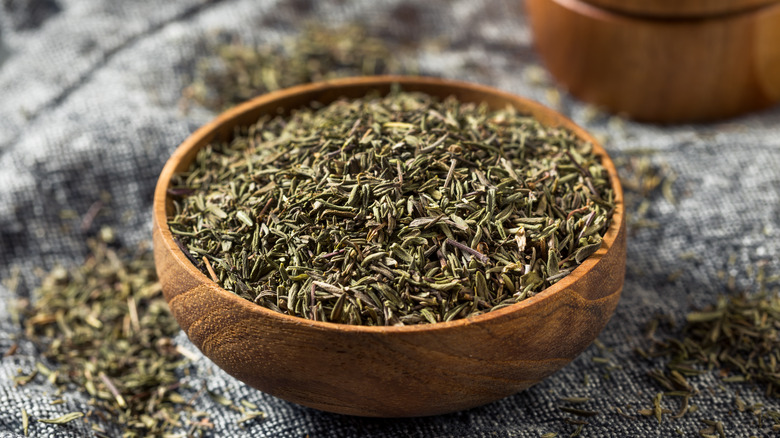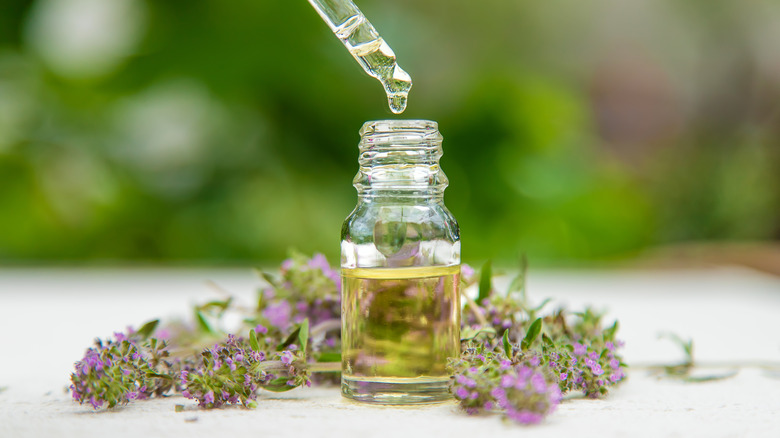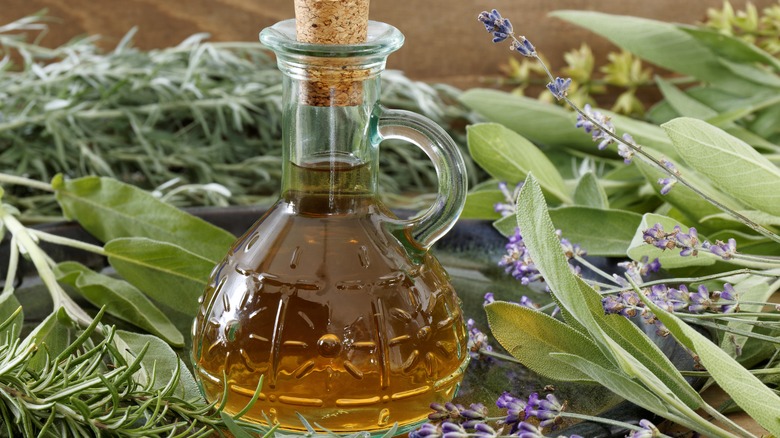Thyme Was Once Used To Fend Off The Black Death
We often think of grassy, woody, and floral thyme as means of adding earthiness and depth to recipes. So meats, fish, vegetables, soups, stuffings, casseroles — and even cocktails and punches — can all benefit from this aromatic herb. Yet beyond being one of your best friends in the kitchen, it is a medicine too. For instance, if you make it into a tea, it's said to help with coughs and bronchitis. In fact, as Fine Gardening points out, Vicks VapoRub is made from thymol, sourced from the oil of thyme. Plus, How Stuff Works outlines other medicinal uses, including as an antibacterial, antioxidant, immune system booster, and treatment for indigestion, rheumatism, and muscle pain. Thyme is also one of the most powerful natural antiseptics around and, for this reason, was used by ancient Egyptian embalmers.
Maybe this is why, as outlined by The Spruce Eats, those humble green sprigs in your local grocery store actually had a much greater significance to ancient and medieval people. Because for thousands of years, thyme acquired many intriguing legends and lore around its properties and power.
Why was thyme important during a medieval pandemic?
For the ancient Greeks, it was a restorative that they bathed in and used to purify their homes. The Romans saw it as a symbol of bravery and would pin it to their tunics before going into battle (via The Spruce Eats). But while thyme was significant to various cultures over the centuries, it became prominent during the "Black Death," a devastating pandemic that swept across medieval Europe and North Africa from 1347 to 1351. It's believed that 25 million people in Europe — up to a third of the population — died of this infection, per Britannica.
Yet some thought they could protect themselves by wearing posies of thyme (via Medical News Today). Partly, this might have been because people believed that the plague spread through "vapors" in the air, so aromatic herbs could ward it off (via WTTW). And in particular, thyme has been seen as a "room cleanser" for millennia.
What's more, some think that the medieval English folk song "Scarborough Fair" contains a message about how to fight the plague with thyme and other herbs. Famously covered by Simon & Garfunkel in 1964, the song begins with the lyrics, "Are you going to Scarborough Fair? Parsley, Sage, Rosemary, and Thyme..." It sounds innocent enough, but it's claimed that this verse hints at a concoction known as "four thieves vinegar," which was said to offer miraculous protection against the Black Death.
The secret elixir that cured bubonic plague?
According to Nourished Kitchen, the story goes that a group of four grave robbers had been stealing the bodies of infected plague victims. Yet mysteriously, they never seemed to get ill. When they were arrested, the authorities gave them a choice — either share the secret of their good health or be executed. The thieves then handed over a recipe for an elixir made of vinegar, herbs, spices, and garlic, which they claimed warded off the plague. The idea was to rub it on your hands, ears, and temples whenever you were near the sick.
Today, no one seems to know the exact recipe for "four thieves vinegar," and some versions don't even mention thyme. Yet, as Nourished Kitchen points out, contemporary herbalists usually do include the herb, as well as lavender, rosemary, and mint. Types of vinegar can vary, but Farmers' Almanac suggests apple cider.
But did it actually work against bubonic plague? As explained by The Herbal Academy, one theory is that the recipe contains ingredients that are natural flea repellents, which helped reduce transmission. Others suggest that the presence of herbs with antimicrobial properties (like thyme) was what mattered.
That said, it's still not clear whether thyme played any significant role in protecting people from the Black Death. But one thing is certain — this powerful herb is a whole lot more than just a tasty addition to soup.


